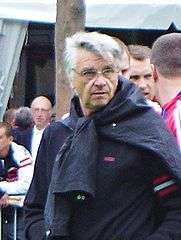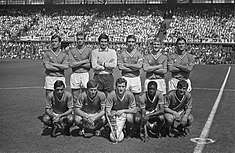Aimé Jacquet
Aimé Étienne Jacquet (French pronunciation: [eme ʒakɛ]; born 27 November 1941) is a retired French football coach and former player. He was manager of the France national football team that won the 1998 FIFA World Cup.
 Jacquet in 2005 | |||||||||||||
| Personal information | |||||||||||||
|---|---|---|---|---|---|---|---|---|---|---|---|---|---|
| Full name | Aimé Étienne Jacquet[1] | ||||||||||||
| Date of birth | 27 November 1941[2] | ||||||||||||
| Place of birth | Sail-sous-Couzan, France | ||||||||||||
| Height | 1.82 m (6 ft 0 in)[2] | ||||||||||||
| Playing position(s) | Defensive midfielder | ||||||||||||
| Youth career | |||||||||||||
| 1958–1960 | Sail-sous-Couzan | ||||||||||||
| Senior career* | |||||||||||||
| Years | Team | Apps | (Gls) | ||||||||||
| 1960–1973 | Saint-Étienne | 192 | (23) | ||||||||||
| 1973–1975 | Lyon | 22 | (2) | ||||||||||
| Total | 214 | (25) | |||||||||||
| National team | |||||||||||||
| 1968 | France | 2 | (0) | ||||||||||
| Teams managed | |||||||||||||
| 1976–1980 | Lyon | ||||||||||||
| 1980–1989 | Bordeaux | ||||||||||||
| 1989–1990 | Montpellier | ||||||||||||
| 1990–1991 | Nancy | ||||||||||||
| 1992–1993 | France (assistant) | ||||||||||||
| 1993–1998 | France | ||||||||||||
Honours
| |||||||||||||
| * Senior club appearances and goals counted for the domestic league only | |||||||||||||
Biography
He was born in Sail-sous-Couzan, Loire.[2] He began his career as an amateur player for his local club, US Couzan, while working in a factory. Scouted by Saint-Étienne, he joined Les Verts in 1960. One of the most successful clubs of the time, Saint-Étienne, won an impressive five league titles and three French Cups in his 11 years with the club. He also played for the national side, but his international career failed to take off because Les Bleus performed poorly during his years on the team. In 1973, he left Saint-Étienne for bitter regional rivals Olympique Lyonnais, where he ended his career as a player.
A "provisional" manager
Jacquet worked as a manager for clubs around France and gained an impressive list of accolades for Bordeaux during the 1980s, leading them to three league titles, two French Cups, two European semi-finals and one-quarter-final. Dismissed by President Claude Bez in 1989, he left Bordeaux to hone his managerial skills with more modest teams like Montpellier and Nancy.
In 1991, he accepted a position with the National Technical Training Centre (Direction Technique Nationale).
In 1992, he was appointed the assistant to then national team manager Gérard Houllier.
After the French national team was knocked out of the running for the 1994 FIFA World Cup by Israel and Bulgaria, Jacquet was made the manager of the national team, but only provisionally. After a promising series of friendly matches (notably a victory over Italy-which qualified for 1994 World Cup in Naples in February 1994), his provisional status was upgraded to permanent.
Jacquet initially selected Eric Cantona as captain and made him the team's playmaker. Cantona had successfully restarted his career in the FA Premier League and was playing some of the best football of his career, but he kicked a Crystal Palace fan in January 1995, which earned him a year-long suspension from all international matches.
As Cantona was the key playmaker, Jacquet was forced to make major changes to the team in the wake of his suspension. Jacquet revamped the squad with some new blood and built it around Zinedine Zidane and other younger players, while dropping Cantona, Jean-Pierre Papin, and David Ginola. Jacquet succeeded in helping France qualify for the Euro 96.
Making it all the way to the semi-finals, Les Bleus managed to show they could survive without veterans such as Papin, Cantona, or Ginola. Jacquet himself stated that the team had done well without Cantona, and that he wanted to keep faith with the players who had taken them so far.[3]
From doubt to victory
In the months that followed the Euro 96, Jacquet honed his team's skills in a series of friendly matches. He adopted a very defensive strategy and made fans anxious because his team never seemed to develop a definitive offensive tactic. The press began to attack the team manager, calling his methods "paleolithic" and claiming that the team had no hope for the World Cup, mentioning about France's failures to qualify for two previous editions in Italy and the United States. Jacquet, taciturn by nature, did not rise to the baiting.
In June 1997 at Le Tournoi, cries of "Resign!" could be heard from the stadium as the French team finished third behind England and Brazil, only coming out ahead of Italy by virtue of goal difference. The press continued to label Jacquet incompetent.
The media's distrust of Jacquet reached fever pitch in May 1998 when, instead of a list of 22 players meant to play in the World Cup, Jacquet gave a list of 28 players, causing the sports daily L'Équipe to write an editorial arguing that Jacquet was not the right man to lead the French team to victory.
However, all that changed when the team began to play in the play-off rounds for the 1998 FIFA World Cup. It was clear that though Jacquet's team was far from being the most flamboyant in French history, it was a perfectly well-oiled machine that neither injury, nor expulsions, nor suspensions, managed to stop. On 12 July 1998, France soundly beat Brazil 3–0 in the Final. Key to the victory was when Jacquet pointed out to his players that Brazilian marking at set-pieces was somewhat suspect, and Zidane headed two goals in from corner kicks.[4]
Following the victory, Jacquet announced that he was leaving his position as manager of the French national team due to previous pressures and criticisms against him.[5] He then became technical director of French football in August 1998, a position which he held until his retirement in December 2006.[6]
Career statistics
Club

| Club performance | League | Cup | Continental | Other | Total | |||||||
|---|---|---|---|---|---|---|---|---|---|---|---|---|
| Season | Club | Division | Apps | Goals | Apps | Goals | Apps | Goals | Apps | Goals | Apps | Goals |
| France | League | Coupe de France | Europe | Other[n 1] | Total | |||||||
| 1960–61 | Saint-Étienne | Division 1 | 2 | 1 | 0 | 0 | – | – | 2 | 1 | ||
| 1961–62 | 0 | 0 | 0 | 0 | – | – | 0 | 0 | ||||
| 1962–63 | Division 2 | 2 | 1 | 0 | 0 | 0 | 0 | 0 | 0 | 2 | 1 | |
| 1963–64 | Division 1 | 2 | 0 | 2 | 0 | – | 2 | 0 | 6 | 0 | ||
| 1964–65 | 3 | 0 | 0 | 0 | 0 | 0 | – | 3 | 0 | |||
| 1965–66 | 27 | 2 | 1 | 0 | – | – | 28 | 2 | ||||
| 1966–67 | 36 | 5 | 2 | 0 | – | – | 38 | 5 | ||||
| 1967–68 | 35 | 3 | 6 | 0 | 4 | 1 | 0 | 0 | 45 | 4 | ||
| 1968–69 | 31 | 3 | 4 | 0 | 2 | 0 | 1 | 0 | 38 | 3 | ||
| 1969–70 | 23 | 4 | 8 | 1 | 3 | 0 | 1 | 0 | 35 | 5 | ||
| 1970–71 | 0 | 0 | 0 | 0 | 0 | 0 | 0 | 0 | 0 | 0 | ||
| 1971–72 | 2 | 1 | 0 | 0 | 0 | 0 | – | 2 | 1 | |||
| 1972–73 | 29 | 3 | 4 | 1 | – | – | 33 | 4 | ||||
| 1973–74 | Lyon | Division 1 | 15 | 2 | 1 | 1 | 3 | 0 | 0 | 0 | 19 | 3 |
| 1974–75 | 7 | 0 | 0 | 0 | 1 | 0 | – | 8 | 0 | |||
| Career total | 214 | 25 | 28 | 3 | 13 | 1 | 4 | 0 | 259 | 29 | ||
Managerial
| Team | From | To | Record | ||||||
|---|---|---|---|---|---|---|---|---|---|
| G | W | D | L | Win % | |||||
| Lyon | February 1976 | July 1980 | 183 | 65 | 42 | 76 | 35.52 | ||
| Bordeaux | July 1980 | February 1989 | 422 | 219 | 115 | 88 | 51.90 | ||
| Montpellier | July 1989 | February 1990 | 25 | 7 | 5 | 13 | 28.00 | ||
| Nancy | July 1990 | July 1991 | 40 | 12 | 11 | 17 | 30.00 | ||
| France | 17 December 1993 | 29 July 1998 | 53 | 34 | 16 | 3 | 64.15 | ||
| Total | 723 | 337 | 189 | 197 | 46.61 | ||||
Honors
As a player
Saint-Étienne
- Division 2: 1962–63
- Division 1: 1963–64, 1966–67, 1967–68, 1968–69, 1969–70
- Trophée des Champions: 1967, 1968, 1969
- Coupe de France: 1967–68, 1969–70
As a manager
Bordeaux
France
Individual
- French Manager of the Year: 1981, 1984, 1998[11]
- French Manager of the Century[11]
- IFFHS World's Best National Coach: 1998[12]
- European Coach of the Year—Tommaso Maestrelli Award: 1998
- Onze d'Or Coach of the Year: 1998
- Berlin-Britz Manager of the Decade (1990s)[13][14]
See also
Notes
- Includes Coupe Charles Drago (1963–64) and Trophée des champions
References
- "Décret du 13 juillet 1998 portant promotion et nomination" [Decree of 13 July 1998 on promotion and appointment]. Journal Officiel de la République Française (in French). 1998 (161): 10831. 14 July 1998. PREX9801876D. Retrieved 4 June 2019.
- "Aimé Jacquet". L'Équipe (in French). Paris. Retrieved 4 June 2019.
- FourFourTwo Great Footballers: Eric Cantona 198.
- "Classic Football: France 1998". Archived from the original on 13 March 2007. Retrieved 24 September 2006.CS1 maint: BOT: original-url status unknown (link). FIFA. Retrieved 17 April 2013.
- "Jacquet to become France technical director". ESPN Soccernet. 17 July 1998. Archived from the original on 17 April 1999. Retrieved 28 September 2014.
- "Aimé JACQUET" (in French). French Football Federation. Retrieved 17 April 2013.
- "Aimé Jacquet" (in French). Pari-Et-Gagne.com. Retrieved 17 April 2013.
- "Aimé Jacquet". Football Database.eu. Retrieved 17 April 2013.
- "Jacquet, Aimé". National Football Teams. Benjamin Strack-Zimmerman. Retrieved 17 April 2013.
- "French National Team coaches". Rec.Sport.Soccer Statistics Foundation. Retrieved 17 April 2013.
- Garin, Erik; Pierrend, José Luis (8 January 2015). "France – Footballer of the Year". Rec.Sport.Soccer Statistics Foundation. Archived from the original on 5 September 2015. Retrieved 17 December 2018.
- "FORMER RESULTS". IFFHS.de. Archived from the original on 15 June 2018. Retrieved 10 November 2015.
- "Messi and Ronaldo: Equal!". UPL. 8 November 2017. Retrieved 25 December 2019.
- Banyas, Volodymyr (25 October 2013). "Berlin-Britz Greatest XI by Decade" (№ 88). newspaper Ukrainskyi Futbol.
- "Décret du 31 décembre 2006 portant promotion et nomination" [Decree of 31 December 2006 on promotion and appointment]. Journal Officiel de la République Française (in French). 2007 (1): 8. 2 January 2007. PREX0609790D. Retrieved 19 August 2019.
External links
- "FIFA 'Classic Football' profile". Archived from the original on 12 March 2007. Retrieved 24 September 2006.CS1 maint: BOT: original-url status unknown (link)